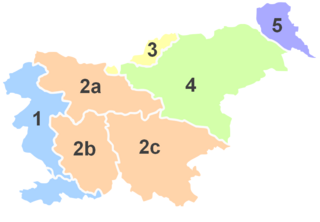
The Slovene Littoral is one of the five traditional regions of Slovenia. The littoral in its name - for a coastal-adjacent area - recalls the former Austrian Littoral, the Habsburg possessions on the upper Adriatic coast, of which the Slovene Littoral was part.

The Vipava Valley is a valley in the Slovenian Littoral, roughly between the village of Podnanos to the east and the border with Italy to the west. The main towns are Ajdovščina and Vipava.
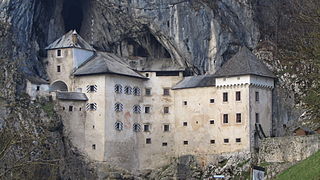
Predjama Castle is a Renaissance castle built within a cave mouth in south-central Slovenia, in the historical region of Inner Carniola. It is located in the village of Predjama, approximately 11 kilometres from the town of Postojna and 9 kilometres from Postojna Cave.

Brežice Castle is a 16th-century castle in the town of Brežice, in southeastern Slovenia, at the street address Cesta prvih borcev 1.
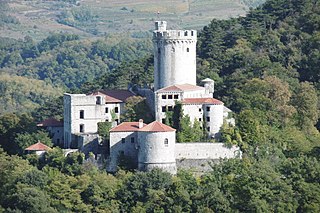
Branik Castle, also known as Rihemberk Castle, is a 13th-century castle above the village of Branik, near the city of Nova Gorica in southwestern Slovenia.

Turjak Castle is a 13th-century castle located above the settlement of Turjak, part of the municipality of Velike Lašče in the Lower Carniola region of Slovenia. The castle is 20 km southeast of Ljubljana and is considered among the most impressive in the area.

Snežnik Castle is a 13th-century castle located in the southwest part of the Lož Valley near the settlement of Kozarišče in the municipality of Loška Dolina, Slovenia. Its name is coincidentally identical to a univerbation based on the Slovene word sneg 'snow', but is actually a Slovenized form of the name of the noble house of Schneberg, whose possession it initially was. The Schnebergs were followed by the houses of Lamberg, Eggenberg, Lichtenberg, and Schönburg-Waldenburg.

Slovenska Bistrica Castle, also known as Bistrica Castle, is a Renaissance-Baroque palace outside the town of Slovenska Bistrica in northeastern Slovenia. Its name derives from the Slovene word bistra 'clear'.
Koprivnik Castle is a castle ruin above the village of Sveta Trojica, near Moravče in central Slovenia.

Kalec Castle is a partially ruined castle in Bač in Slovenia.
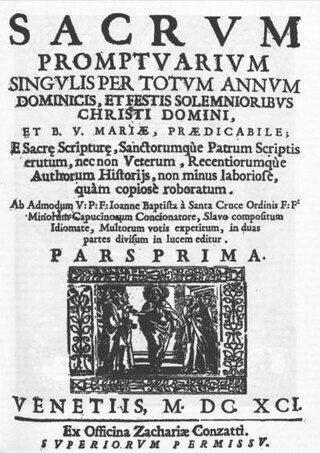
Tobia Lionelli was a Slovene–Italian preacher and writer in the Baroque period. His sermons had a crucial role in the affirmation of Slovene as a language. He is also known by his monastic name John Baptist of Sveti Križ in Vipava.

Holy Trinity Church is a historical building in Hrastovlje, a village in southwestern Slovenia. There are two hypotheses about its origin. According to the first, it is a Romanesque church from the 12th century. According to the second, it is an example of the Istrian variant of Early Venetian Renaissance architecture from the 15th century.

Kozjak Castle is a 13th-century castle ruin on a rocky hill above the village of Dolenje Selce near the town of Dobrnič, part of the Municipality of Trebnje in Lower Carniola, Slovenia.

Metlika Castle is a 15th-century castle located above the old part of the town of Metlika in southeastern Slovenia, very near the Croatian border.

Leskovec Castle or Turn Castle is a 15th-century castle north of the village of Leskovec pri Krškem, southeastern Slovenia. It has been redesigned in the 16th and the 18th centuries.

Vipava Castle is a castle ruin above the town of Vipava in the Municipality of Vipava in southwestern Slovenia.
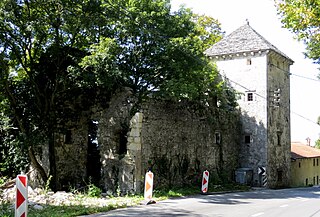
Trilek Castle, also known as Old Castle, is a small castle or fort in the settlement of Col, in the Municipality of Ajdovščina in southwest Slovenia. Built in the early 16th century, it was first mentioned in the 17th-century historian Johann Weikhard von Valvasor's 1689 survey The Glory of the Duchy of Carniola.
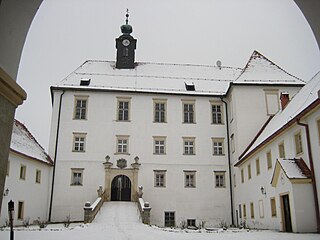
Gornja Radgona Castle is a castle in Gornja Radgona, Slovenia.





















